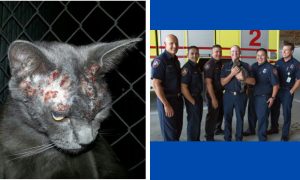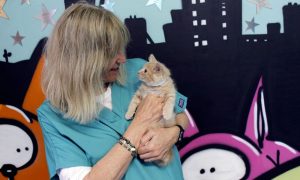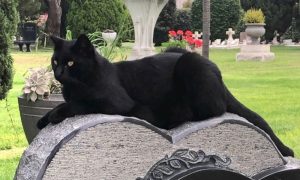A tiny gray cat with sores across her face and head caught the attention of firemen at Station 17 in Los Angeles County, who rounded her up and then transported her to FixNation, a nonprofit spay and neuter clinic.
FixNation treated the Russian Blue with antibiotics, traced a microchip back to owners who were willing to surrender her, and then asked the firefighters what they wanted to do. The station chose to officially adopt the cat, whom FixNation calls “Shadow” — but whom they added has about 14 different nicknames gifted to her by her now adoring firefighter family.
Meanwhile, the owners of the iconic Hollywood Forever cemetery noticed a black cat sunning himself on their gravestones. FixNation sterilized the sleek stray and returned him to his domain. The cat, now named Close Up, is reportedly doing well and has since amassed nearly 10,000 followers on his Instagram account, @closeupthecemeterycat.
Shadow and Close Up were just two of an estimated one million to three million stray, feral, or companion cats roaming L.A.’s streets at any given time.
Unfortunately, their happy endings are an anomaly.

Shadow, before and after (Photos Courtesy of FixNation)
“Community cats” often are treated cruelly or chased away by people who consider them akin to vermin, said Kimberlie Hamilton, a board member with FixNation.
And, with COVID-19 lockdowns and a 10-year ban only recently ending on city-supported Trap–Neuter–Return (TNR) programs, the cats’ numbers have kept growing.
“Los Angeles has more community cats than any other city in the nation, and the population has skyrocketed due to COVID, as many spay and neuter services were suspended, allowing the cat population to grow unchecked,” Hamilton told Lady Freethinker (LFT).
Left unchecked, exploding cat and kitten populations mean more cats who can suffer, less public tolerance, and increased pressure on the environment and animal control, FixNation said.
FixNation, which has sterilized an estimated 225,000 community and companion cats in the last 20 years, is working relentlessly to help make the City of Angels a more compassionate place for cats by reducing homeless cat populations and demonstrating the effectiveness and humane nature of TNR for cat colonies.
TNR, officially endorsed by more than 90 U.S. cities and counties, is a population management approach in which rescuers capture stray cats in humane traps, sterilize them, and return them to the areas where they were found.
It’s the preferred solution for FixNation when community cats are likely too feral to find forever homes, overflowing shelters are stretched to capacity and more likely to kill intakes, and the returned cats have dedicated caregivers to look after their well-being, said Co-Founder and Executive Director Karn Myers.

Karn Myers with a FixNation client (Photo Courtesy of FixNation)
Unspayed kittens can get pregnant as young as 4 months of age and can have multiple litters each year — making the quadrupling of cat populations possible in a very short time, FixNation said.
“TNR is the only humane way to honor the lives of the kitties that are already here but stop them from overpopulating with more babies,” Myers said.
TNR isn’t without its opponents. In 2009, bird and wildlife groups sued L.A. over plans to implement a TNR program, saying that the environmental impact — including for birds killed by free-roaming cats each year — hadn’t been adequately studied. A judge agreed in 2010 that a comprehensive study was needed, and for the next 10 years, cat welfare organizations like FixNation — which receives no city or government funding — were on their own.
The ban was lifted in 2020 when the city council conducted the environmental impact report and determined that TNR programs were permissible.
Myers acknowledged that she loves birds and doesn’t want to see them die. She’d love to live in a world where all cats are cared for and kept indoors — as did her late husband Attorney Mark Dodge, who advocated tirelessly for community cats, assisted in writing a model TNR policy for L.A., and passed away several years ago after battling a rare form of ALS.

Karn and Mark Dodge (Photo Courtesy of FixNation)
But that’s not the reality for Los Angeles — or anywhere else in the world.
“There’s no easy answer,” she said. “I wish people would be responsible and keep the cats in their homes. Mark always used to say, ‘Humans are the ones who domesticated cats, so now it’s our responsibility to care for them.’ The only thing that Mark and I felt we could do is what we are doing now — preventing more cats from being born.”
The environmental impact study and the lifting of the ban underscored what FixNation’s leaders had researched and found to be true — that TNR ultimately is the most humane and most cost-effective approach which will still allow cats to live their best possible lives.
Myers noted that sometimes well-intentioned trappers will take feral cats and kitties to shelters, believing their actions will result in adoptions and loving forever homes for the cats.
The reality is that too often shelters have no room and little resources for socializing feral cats they deem “unadoptable” and instead kill them after the required holding period, FixNation said.
FixNation also noted cat removal — or trapping the cats and then releasing them to a different area, or worse, killing them — creates a well-documented “vacuum effect,” in which other stray cats sense the void in the colony and step in to fill it.
“Trapping and removing cats often results in having even more unsterilized cats in the location than when you started,” FixNation wrote on its website. “Catch and kill is very costly, doesn’t work, and ultimately it’s inhumane.”

Close Up the cat (Photo Courtesy of FixNation)
In addition to the sterilizations, FixNation offers free medical care to ailing community cats, TNR education and training, and a free humane trap loan program to community members who want to help. For years, the nonprofit also has offered low-cost sterilization, microchipping, and vaccinations for companion cats — although those services have recently been suspended due to COVID-19.
The nonprofit’s permanent facility often takes in up to 100 cats each day, four days a week. From sterilizing Jay Leno’s famous “garage cats” or Disneyland’s strays to working with local rescuers or businesses to TNR cat colonies, FixNation plans to continue their efforts.
“Our mission is all about treating these innocent animals with loving kindness and expert medical care, while helping reduce their numbers in a natural and humane manner,” the nonprofit said. “We will keep striving to build a better world for cats, and envision a day when all tame cats have a home and all community cats are spayed or neutered and cared for in their outdoor homes.”
RESOURCES
FixNation: Those interested in learning more about FixNation can check out their website here or their Facebook page. They’re also on Instagram! The nonprofit’s efforts — and L.A.’s feline frenzy — also was documented in the feature films “Crazy Cat Lady,” which won several awards in 2022 and is available via streaming, and the documentary “Cat People,” available for rent on Amazon, for anyone who wants to watch!
Low-Cost Services: For California residents looking for low-cost sterilizations who live outside of Los Angeles County, SpayCalifornia has a statewide database of providers here.
Community Cat Care: FixNation has a tip sheet for community cat caretakers as well as a fact sheet about how to handle newborn kittens here. Alley Cat Allies’ Feral Friends Network also is a great resource for finding veterinary care, TNR advice, or other assistance local to your area.
Community Cat Shelters: Those seeking to build shelters for community cats can check out resources from Neighborhood Cats here and Spay and Stay here.








